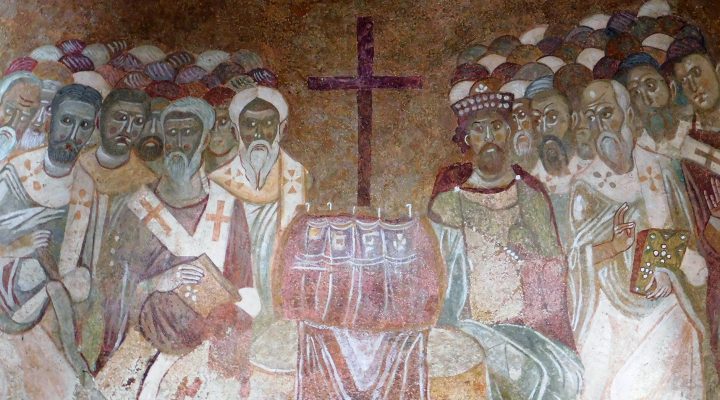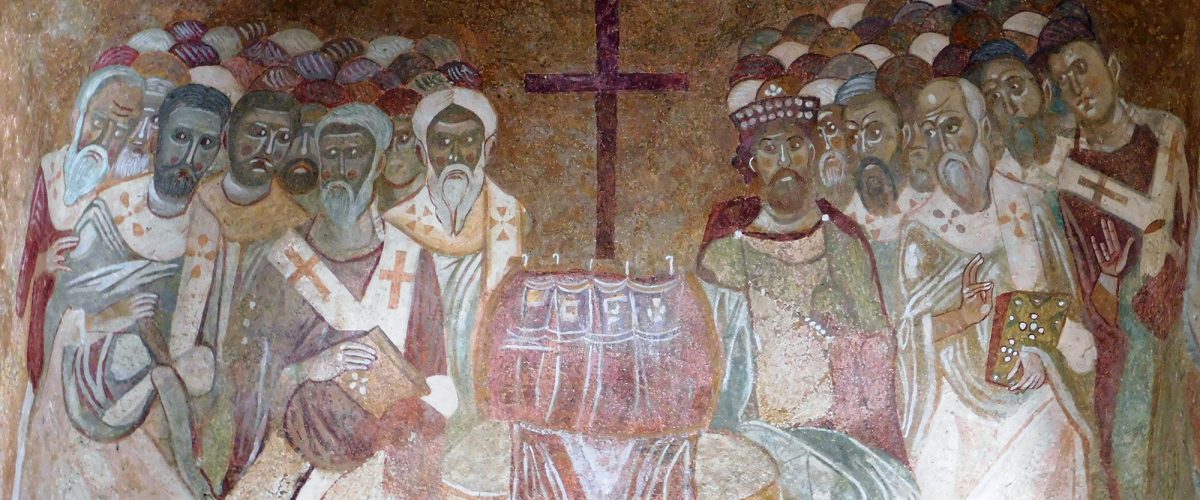Four Southern Baptist theologians and pastors intend to ask messengers to this year’s Southern Baptist Convention annual meeting to adopt the Nicene Creed as part of the denomination’s official faith statement.
In the sweep of Baptist history, this is an unusual development, but in the modern history of the SBC, it could be seen as an attempt to limit even more narrow doctrinal parameters from being adopted.
The Nicene Creed, first articulated in 325 at the First Council of Nicaea, is widely used within Christianity. It is one of two creeds — the other being the Apostles’ Creed — that define the common parameters of orthodox Christian belief among a majority of the world’s Christians.
The Nicene Creed, first articulated in 325 at the First Council of Nicaea, is widely used within Christianity.
Baptists, however, have prided themselves on being “not a creedal people.” A historic declaration taught in Baptist seminaries for centuries is that Baptists “have no creed but the Bible.”
While Catholics and Methodists and Presbyterians and Lutherans and Episcopalians frequently recite one of the two common creeds as part of worship, most Baptists do not.
On May 29, four Southern Baptists announced their intent to call for a change in Southern Baptist identity. The announcement came from Andrew Brown, pastor of First Baptist Church of Starkville, Miss.; Stephen Lorance, pastor of leadership development at Two Cities Church in Winston-Salem, N.C.; Steve McKinion, professor of theology and patristics at Southeastern Baptist Theological Seminary; and Malcolm Yarnell, research professor at Southwestern Baptist Theological Seminary.
They proposed to add the Nicene Creed to the Baptist Faith and Message, the SBC’s doctrinal statement, “for the sake of doctrinal clarity and increased unity.”
In a May 30 statement, the four offered three reasons for their upcoming motion at the SBC annual meeting in Indianapolis:
- “The Nicene Creed authoritatively articulates the primary doctrines of the Christian faith from the Christian Scriptures.”
- “For nearly two millennia Christians have universally used the Creed for both teaching and worship.”
- “The Creed is a robust and indisputable summary of orthodox Christian belief in the two most central and indispensable dogmas of the universal Christian faith: God the Trinity and the Lord Jesus Christ.”
At least two streams of thought are wrestling for internal control of the nation’s largest Protestant denomination. One stream, linked to Calvinism and centered at Southern Baptist Theological Seminary, seeks to enforce strict doctrinal purity. The other stream, linked to a broader evangelical conservatism and centered at the other five SBC seminaries, seeks unity on a smaller set of essentials.
The Nicene Creed embodies what that second group most often considers essential doctrine.
The four who propose the addition to the Baptist Faith and Message said they are doing so because they believe even the SBC needs clearer doctrinal parameters because the Baptist Faith and Message is “underdeveloped” in certain areas, such as its articulation of the Trinity.
“The Creed is a robust and indisputable summary of the gospel of Jesus Christ embraced by all true Christians in all places.”
“The Creed is a robust and indisputable summary of the gospel of Jesus Christ embraced by all true Christians in all places,” they said. “At a time when denominations are abandoning the faith at an alarming rate in favor of gender ideologies, secularist politics and universalistic dogmas, we as Southern Baptists must restate in clear and unambiguous terms our singular, unifying, Christ-honoring, God-exalting, Spirit-empowered faith.
“Jesus Christ, the Eternal Son, is our one Lord. If we do not speak with certainty about the truths with the church throughout the ages, we will invariably find that our faith and message, no matter how well-intentioned, diverges from that once for all delivered to the saints.”
As for those who are nervous about Baptists adopting a creed, the four said: “Even the various framers of the Baptist Faith and Message understood some truths were so fundamental they must be called a ‘creed.’ Creeds, they believed, encapsulated the teaching of Scripture required for Christianity, whereas confessions denominated one Christian church or group of churches from another. What is more, The Preamble’s five limiting statements, which have been rightly and repeatedly stated through the last century, need a creed to help center the confession and simultaneously demonstrate that our faith is truly Christian.”
Attempts to amend the Baptist Faith and Message from the floor of the convention have become more commonplace in recent years, prompting a Cooperation Group recently to recommend that edits to the Baptist Faith and Message meet a higher threshold than a single motion at an annual meeting.
The task force said: “To ensure that edits or amendments to the Baptist Faith and Message follow the same process as amendments to the Constitution (two-thirds vote, two consecutive years), we recommend the Executive Committee propose changes to our governing documents for the convention’s consideration at the 2025 annual meeting.”
Historically, the SBC has appointed special committees to develop revisions as happened in 1963 and 2000. But last summer, a messenger to the annual meeting managed to amend the faith statement with a simple vote from the convention floor.
That successful amendment to Article VI concerns a definition of the role of pastor. The original wording called the “scriptural officers” of the church “pastors and deacons.” The revision says the church’s “two scriptural offices are that of pastor/elder/overseer and deacon.” The amendment further clarifies that “the office of pastor/elder/overseer is limited to men as qualified by Scripture.”
One of those immediately opposing the Nicene Creed proposal was Andrew Walker, ethics and public policy professor at Southern Seminary. He wrote on X: “Attempting to edit the Southern Baptist Convention’s confession of faith from the floor of the annual convention is a mistake. Everyone agreed what transpired last year was a procedural nightmare (even if you conceptually agreed with the edits as I did). The Cooperation Group’s recommendations include ceasing the ability to edit for just this reason — even edits that would improve it. It would be unwise to make any further edits to the Baptist Faith and Message 2000 from the convention floor, and hopefully, we will take corrective action to prevent this from happening again.”
This proposal is one of dozens of recommendations likely to be made when the SBC annual meeting convenes in Indianapolis June 11-12. According to SBC procedures, the Committee on Order of Business, guided by the presiding officer, determines what happens to motions made from the floor. Most often those motions, if ruled in order, are referred to committees or agencies for evaluation. However, messengers have the right to demand, by majority vote, that any motion be brought to the floor for an immediate vote — which has happened several times in recent years.


